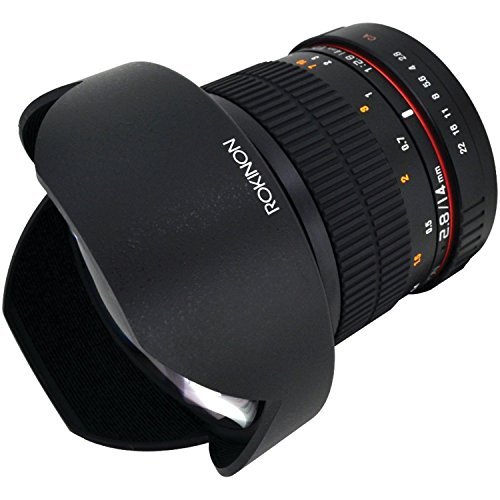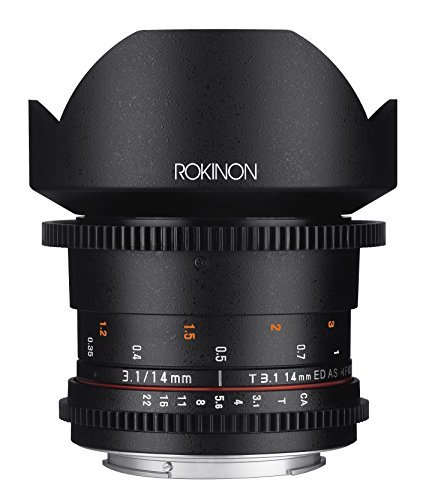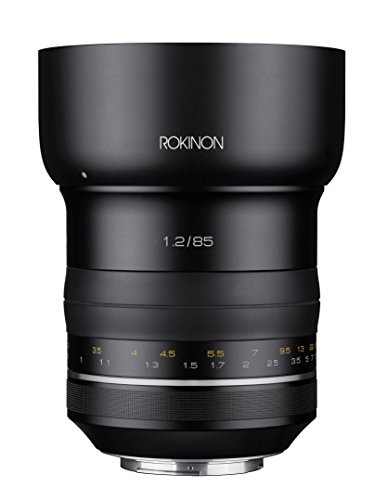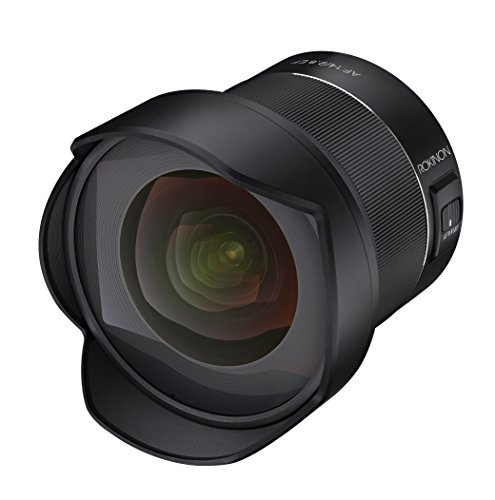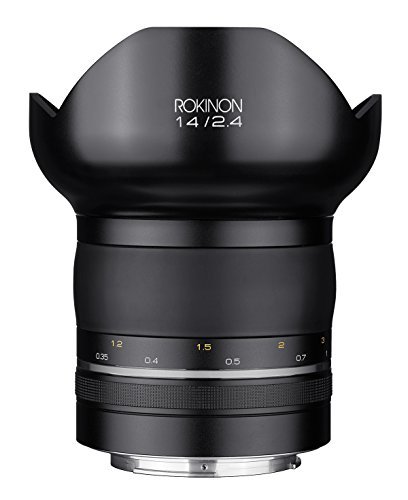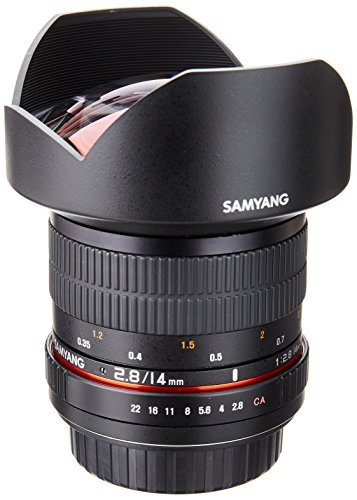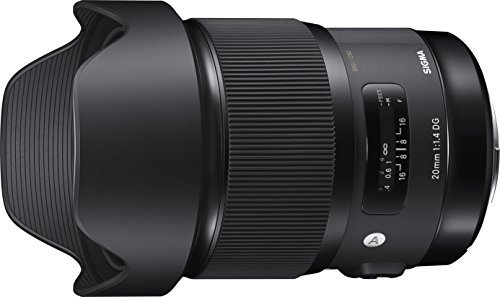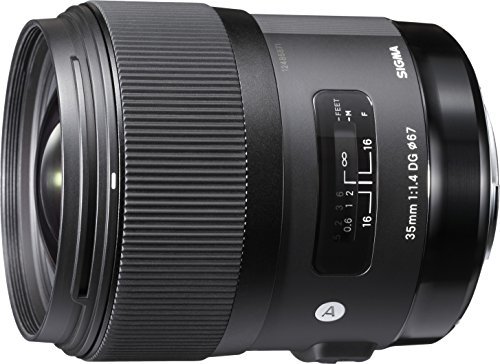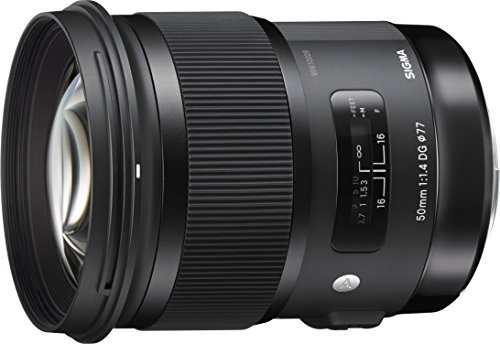Astrophotography is known to be a quite demanding genre of the photography that uses different characteristics and qualities of the lenses.
Different characteristics such as focus scale and chromatic aberration are given a lot of importance which makes shopping for astrophotography lens difficult.
Thankfully you won’t have to face any kind of problem as we are covering the Top 10 best canon lens for Astrophotography. In addition, we are also covering the Buyer’s guide and the frequently asked questions that will make your buying decision quite hassle-free.
So, let’s waste no more time and thus have a look at the list of products.
Table of Contents
Toggle10 Best Canon Lens For Astrophotography:
1) Rokinon FE14M-C 14mm F2.8 Ultra-Wide Lens for Canon (Black)
This product from Rokinon is simply amazing and it is designed in a way such that it provides dramatic 115.7 degrees on the full frame cameras. It is quite perfect for capturing landscapes, astrophotography, and real estate images.
Besides this, it also works quite well with DSLR and Mirrorless cameras to provide 94-degree angle with APS-C cameras, 90 degrees with the Canon APS-C cameras and 76 degrees with the Micro 4/3 cameras. It also helps in producing clearly defined images having minimum chromatic aberrations and distortion.
It uses 1 Hybrid Aspherical element, 2 ED elements, 3 High Refractive index and also one glass Aspherical element for sharply defined images. This product also utilizes Ultra Multi Coating to reduce the ghost and flare images.
The lens offers the highest quality and at the same time, it is quite affordable as well. It is designed for the full frame cameras and it is quite compatible with the APS-C cameras. The picture that you click from the lens can be clear and razor sharp even at the corners as well.
What are the features?
- Capture the full scene
With this lens, you can get an ultra-wide rectilinear view which is quite good for landscape photography, real estate photography, astrophotography, street photography etc.
- Low Ghosting and Flare
With the use of UMC Multicoating, the ghosting and flare are reduced while increasing the light contrast and transmission.
- Capture the spectacular night Images
It offers excellent sharpness and low coma which makes it quite ideal which for capturing the images at night.
- Prime lens Advantages
Prime lenses, in general, are quite light, sharp and they can even work quite well even in the low lighting condition.
Pros
- It comes at very affordable pricing.
- It offers great images which are quite crisp.
- It is equipped with a solid lens cap which provides extra protection.
Cons
- It has manual lens
- The range ring is not present in order to assist the depth of field.
2) Rokinon Cine DS DS14M-C 14mm T3.1 ED AS IF UMC Full Frame Cine Wide Angle Lens for Canon EF
This is second on our list of the best Canon lens for Astrophotography which offers great ultra wide-angle photography as well as image sharpness. Besides this, it comes at a very affordable price which makes it an attractive option.
The Rokinon 14mm T3.1 Cine DS Lens for Canon has been designed in such a way that it can be quite useful for cinematographers and videographers. Besides this, the lens is compact and solid which makes it quite travel-friendly and perhaps easy to use. It also includes the industry geared focus rings and de-clicked apertures. The glass of the lens is Ultra Multi-coated and the focusing scales are present on both side of the lens.
The UMC coating of Rokinon’s enables the consistent color rendition and at the same time minimizes the ghosting & Flaring. It also includes the removable petal-shaped lens hood which provides the flare protection when you are shooting without using a matte box.
The lens is also useful for low-light shooting and also useful in creating a shallow depth of field. It also features 6-blade Aperture which allows for creating beautiful and soft bokeh.
What are the features?
- Cinematic quality
The lens delivers sharp and clear video quality as well as tight color matching that is needed for a professional videographer.
- Low light
It features a large aperture design that works in low light and perhaps gives an amazing picture quality.
- Internal focus
The focus is achieved without any rotation or lengthening of the elements of the front lens.
Pros
- It offers great wide angle lens suitable for amazing photography and cinematography.
- It can cover the full frame sensors equivalent to the size of 35mm film.
- It offers you great value for money.
Cons
- At times, you may come across distortion by using this lens.
3) Rokinon Special Performance (SP) 85mm f/1.2 High-Speed Lens for Canon EF with Built-in AE Chip, Black
Rokinon SP 85mm F1.2 is one of the best Canon Lens for Astrophotography that you can opt for. It is a high-speed product and works according to the highest photographic standards. It produces 50 megapixels image quality and 8k video productions with exceptional focus capabilities and low light.
It is made using premium quality material and it is quite fast which helps in providing optimal performance. Besides this, it features nine blade diaphragms and large aperture which can potentially blur the background and at the same time create gorgeous bokeh.
It is quite ideal for weddings and portraits and it is also a good choice if you wish to click a photo in low light conditions and astrophotography. It also has ten elements in seven groups which ensures that you get top-notch image quality from the center as well as from the corner of the image.
The Rokinon SP 85mm F1.2 is also equipped with damped, precise and easy to use manual focus control. Furthermore, it also has a filter mount (non-rotating) which can be used with polarizing.
What are the features?
- Great Image quality
It has a very good quality lens which looks quite beautiful and it gives a cinematic look. It is not very tough to use and once you are used to operating it you would never face a problem.
- Value for money
There is a lot of camera lens available with different price range which may or may not justify the price tag. If we talk about this particular product, then it certainly offers the best value for money that you might have invested.
- Bokeh
The bokeh feature from this lens is exceptionally good and it wouldn’t distract you at all. Besides this, it is creamy and you will definitely get outstanding out of focus area with the help of this lens.
Pros
- Nice bokeh
- It produces sharp image quality.
- It is made using sturdy materials which can last for a long time.
Cons
- It is not equipped with the autofocus option.
- Weather sealing option is not present in this lens.
4) Rokinon AF 14mm F2.8 Weather Sealed AutoFocus Wide Angle Lens for Canon EF, Black (IO14AF-C)
Rokinon AF 14mm F 2.8 is the first autofocus lens that has been manufactured by the company. It also offers weather sealing option that is the first of its kind produced by the Rokinon. It offers best in class optical performance and at the same time, it is quite good for professional use. All these make it quite tempting to purchase this excellent product.
This lens features a bright 2.8 aperture, 7-blade aperture for the pleasing star and bokeh effects and weather sealing against different elements. If you compare it with the lens of the same class, then it is definitely the pick among those. It has reduced weight and size, wider angle of view, faster and accurate operation.
In order to produce superb image quality, it utilizes anti-reflective coatings and also contains fifteen elements in ten groups. Outstanding image clarity is produced from the center to the corners of the image with the assistance of four High Refractive Index lens.
The additional feature of this lens includes a durable metal housing with an in-built Manual/ Auto Focus switch.
What are the features?
- Ultra Wide angle
It can help to enhance your view and thus expand the field of view by enabling the panoramic perspective.
- Metal barrel
It comes up with metal Barrel which makes the lens more durable and lighter.
- Low distortion
It minimizes the distortion that is created by the lens on the object and thus they appear to be curved.
Pros
- It provides accurate autofocus whenever it is needed.
- It provides sharp output.
- It comes up with the weather sealing option.
Cons
- There can be a few inconsistencies in terms of the focus of the lens.
5) Rokinon Special Performance (SP) 14mm F2.4 Ultra Wide Angle Lens with Built-in AE Chip for Canon EF
The Rokinon 14mm f2.4 SP is the fastest wide angle lens that you would probably get in the market. Besides this, the lens carries the Rokinon Special designation performance and it offers the picture quality of 50 megapixels and 8K video productions. In addition, it can work quite well in low light and offers amazing bokeh feature.
The best thing about this product is the fact that it is available at an affordable price which makes it an attractive option. It offers a metal exterior body and rubber focusing ring which makes the built quality very strong. It offers excellent control of distortion which makes it quite an ideal option to purchase.
What are the features?
- Ease of use
This product is equipped with simple functionalities which makes it quite easy to use. The lens hood is also present which helps to safeguard the lens.
- Build quality
The company has done quite a good job in making a very good build quality of the lens which is surely bound to last for a long period of time.
- Image quality
The best thing about this lens is that it offers excellent image quality that can definitely help you out in your professional use.
Pros
- It offers Fantastic image quality.
- It offers different color options.
- It is not very large in size.
Cons
- The weather sealing option is not present.
- The aperture of the lens is not fast.
6) Samyang SY14M-C 14mm F2.8 Ultra Wide Fixed Angle Lens for Canon
The following lens from Samyang is considered to be one of the best canon lens for Astrophotography and it is perhaps one of the most affordable lens that you can get in the market. It can work quite well for full frame cameras and it is also quite compatible with the APS-C cameras. Besides this, the construction and build quality are also superb.
The lens construction is divided into 14 elements in 12 groups and it also features 2 ED lens elements. All these elements are useful in minimizing the distortion as well as chromatic aberrations.
The pictures that you are going to click through this lens are going to be razor clear and sharp, even at corners. On the full frame cameras it features 115.7 Degree angle of view while on APS-C cameras, it features 115.7 Degree angle of view.
What are the features?
- Value for money
This is perhaps the most affordable lens that you can get in the market which makes it great value for money.
- Great performance
It is equipped with great optical performance and also the sharpness at the center of the picture is quite excellent.
- Good image quality at night
It offers excellent sharpness which makes it quite ideal for capturing the image at night.
Pros
- It is relatively lightweight as compared to other lenses in this segment.
- It is quite inexpensive.
- It comes up with very good build quality.
Cons
- The illumination falls towards the corner.
- It has Wavy distortion.
7) Sigma 20mm f/1.4 DG HSM Art Lens for Canon
This lens from Sigma is truly quite fast and wide which is surely going to impress you. Besides this, it comes up with a sophisticated optical design and robust physical construction which makes it a perfect choice for you. It is further equipped with 15 elements which are present in 11 groups.
Above all, it also has a Multi-layer coating present in it which helps in minimizing the surface reflections, flare as well as ghosting such that the color accuracy and contrast is increased.
It also has consistent image quality and wide focal length which makes the following lens quite suitable for applications such as astrophotography, interior, landscape and architectural. It also has a fast f/1.4 aperture which makes it ideal for low-light and natural shooting.
The lens also helps in providing smooth, fast and silent autofocus performance with the assistance of Hyper Sonic Motor. The lens barrel has also been designed using the composite material which is thermally stable which can work in different conditions and temperature.
In addition, the lens mount is built using brass such that it can offer mounting accuracy as well as long-term durability.
What are the features?
- It minimizes the chromatic aberrations
This lens from sigma has been designed in such a way that it can minimize the chromatic aberrations which are a common issue in ultra-wide-angle lenses.
- Good handling
The Sigma lens has been built in a way such that it has a lot of metal present in its design. In addition, it has been constructed using stable composite material such that greater precision is offered in wide temperature variations. Hence, it offers good handling for the customers.
- Performance
This lens from Sigma offers the autofocus functionality which can be quite handy. In addition, the chromatic aberration is controlled and vignetting is minimal. In addition, the lens hood keeps the stray light away and thus helps in delivering an excellent performance.
Pros
- You will experience no distortions or aberrations while you are using this lens.
- It is made using sturdy material.
- It is equipped with auto-focus functionality.
Cons
- The price is a bit on a higher side.
8) Sigma 35mm F1.4 ART DG HSM Lens for Canon
This product from sigma is backed with a wide aperture which makes it one of the best canon lens for Astrophotography. It is also quite accurate and quick to focus due to the Hyper Sonic Motor and inner focusing system.
This lens has got the capability to capture the shallow depth of field which helps in creating a lovely soft background. It is also available at a lower price point which gives great value for money to the customers.
The HSM ensures that you get high speed, quiet and accurate autofocusing. On the other hand, the focusing system helps in obtaining a superior optical performance while the subjects are at a closer distance.
It also features a large 1.4 aperture which makes it quite convenient in low light. Besides this, the lens is also compatible with Sigma USB dock and Optimization Pro software which makes this lens a perfect choice.
What are the features?
- Less expensive
This lens is perhaps less expensive compared to other brands of the same segment.
- Shallow depth of field
This lens is equipped with a shallow depth of field which ensures that you get softer bokeh blur.
- Wide angle
This lens features a wide angle and perhaps a wide f/1.4 aperture.
Pros
- The lens is constructed in a beautiful manner and it is quite easy to use.
- It is equipped with the weather sealing option.
- It has a very good depth of field which gives sharp and beautiful images.
Cons
- It misses the focus a lot, especially on the wider shots.
9) Sigma 50mm F1.4 ART DG HSM Lens for Canon
50mm lenses are quite a favorite for a lot of photographers. They are very versatile and they can be used for a lot of purposes such as Street Photography, portraits, astrophotography, and landscapes.
The Sigma 50mm f/1.4 Art is perhaps the best canon lens for Astrophotography that you should consider buying especially if you want to take sharp images in a moderate budget.
This lens has been re-engineered and redesigned such that a new standard is set in the art line. It offers a large 1.4 aperture which is quite perfect for shooting almost everything. It is also equipped with Hypersonic motor which ensures that you get a smooth, quiet and accurate autofocusing and perhaps super multi-layer coating. It is also a very high-performance lens for the DSLR sensors.
It comes up with 13 elements divided into 8 groups such that you get unmatched performance even with close-up photography and wide apertures. It is certainly an exceptional standard lens that you should definitely bring to your home.
What are the features?
- Stylish and sturdy build
This lens from sigma looks quite amazing and it can definitely impress anyone. Furthermore, it is built using good quality material which will help the product to last for a long period of time.
- Versatile
This lens is indeed quite versatile as it can be used for a lot of purpose such as portraits, street photography, landscapes, astrophotography etc.
- Best standard prime lens
It features the best standard prime lens having a f/1.4 aperture.
Pros
- It is available at a very competitive price which offers you great value for money.
- It has a very impressive design.
- It comes up with a very good built quality.
Cons
- It is slightly heavy and bulky.
- You may sometime have to face autofocus inconsistencies while using this lens.
10) Tamron SP AFA012C700 15-30mm f/2.8 Di VC USD Wide-Angle Lens for Canon EF Cameras
This lens from Tamron is considered a good option for the purpose of astrophotography. It offers f/2.8 aperture and a wide angle which potentially means that you can capture the best possible images at night.
It comes up with other exciting features such as low chromatic aberration, great optics and image stabilization which helps you in capturing clear and sharp images even in the low-light settings. Besides astrophotography, it is also quite useful for architecture and landscapes photography.
This lens has got the capability to offer superb performance and image quality. It also offers great versatility to different kinds of photographic situations. It comes up with 18 elements in 13 groups which help in delivering great image quality. It can also be quite useful in delivering the bokeh effects.
So, it is definitely one of the best canon lens for Astrophotography that you should definitely think of purchasing.
What are the features?
- Super wide angle lens
This lens offers ultra-wide angle lens with the fixed F/2.8 aperture.
- The best quality image in low light
This lens has the capability of producing sharp images even in low light with very little coma.
- Vibration compensation
It offers vibration compensation which ensures that you capture a stable image.
Pros
- It is available at a lower price.
- It offers great image sharpness.
- It has the least distortion for zoom.
Cons
- This lens can be a bit bulky and heavy
Buyer’s guide - How to select the best canon lens for Astrophotography?
There are a few factors that you need to consider for selecting the best canon lens for astrophotography. Some of them have been mentioned below:-
Focal length
In general, it is seen that wide-angle lens is being used as a choice for the purpose of astrophotography. The reason behind this is the fact that it gives you more choice in terms of the viewing angle and perhaps the limit of the sky that you want to fit in your frame.
In addition, a focal length also helps in determining the shutter speed that you can use. On the wider angle lens if you use the long shutter speed then the stars would be captured blurred while they are moving.
On the other hand, a shorter focal length would probably be using a longer shutter speed without getting the trailing effect.
Chromatic abbreviation and Coma
One of the best things about the astrophotography lens is the fact that they have a high degree of chromatic aberration and coma control. These two terms are basically being used to point out slight distortion of points of light especially when you are shooting in the dark conditions.
It can potentially make the stars look a bit in the odd shape and you can clearly notice it on the edge of the frame.
So, the more suppressed chromatic abbreviation and coma are, the better and clearer pictures you can get.
Aperture
The aperture of the lens plays a significant role in contributing how much light would enter the sensor. If you are having a wider aperture, you can use a lower ISO and shorter shutter speed. This potentially means that you can capture an image with potentially less noise.
For the purpose of astrophotography, it is recommended to purchase a lens with a wider aperture. It can be a bit costly but there are a lot of options from the list above that you can use which may not cost you much.
FAQs- Best Canon Lens for Astrophotography
1) How is photography done in the Night sky?
You can take a photograph in the Night sky by starting with as wide as F/stop according to the capability of the lens and make sure that the shutter speed is around 20 seconds.
If you increase the time frame of the shutter speed more than that, then there is a probability that the pictures would start to blur. You can also increase the ISO if required such that you get a good exposure.
2) What is the setting that we need to use for night photography?
To start off, you would need to put the camera in the manual mode. It is seen that it is quite easy to shoot in the manual mode. Further, you would have to find a Tripod while you are shooting for the night photography which would give the much-needed support.
Also, make sure that you set the aperture as low as you can and finally set the shutter speed to 10 seconds and ISO to 1600.
3) What is lens Coma?
Lens coma in an optical system is significant to the aberration present in the optical designs or because of the imperfection that is present in the lens which causes the off-axis point sources such as starts to appear distorted having a tail that is similar to a comet.
Conclusion
Capturing the astrophotography through the canon lens is not an easy task and it would perhaps need the right kind of equipment. So, above we have presented the list of best canon lens for astrophotography after doing a lot of research and comparison.
You can perhaps purchase any of the mentioned products that have been listed above as per the requirement that you might be having. We have also mentioned the buying guide and FAQ and it is recommended that you go through it before you purchase any products.
In addition, you can get in touch with us for any kinds of queries that you might be having by adding a comment down below and we would be more than happy to help you out.
People Also Read:
Best Canon Lens for Bird Photography
Best Canon Lens for Portrait and Landscape Photography
Best Lens for Night Photography
Best Nikon Lens for Astrophotography
